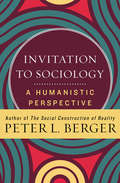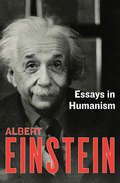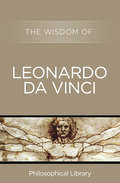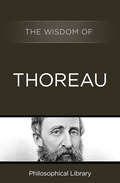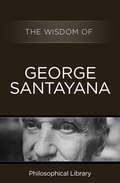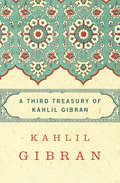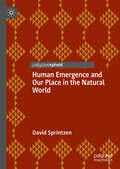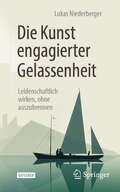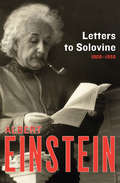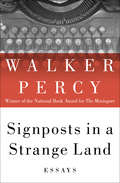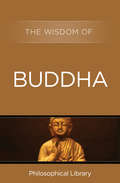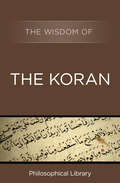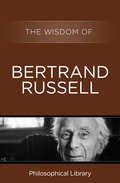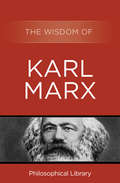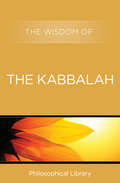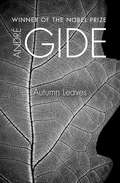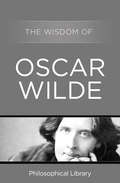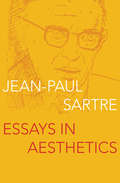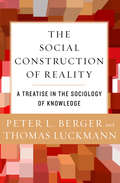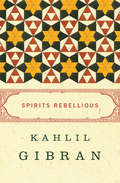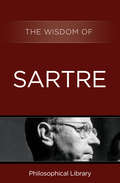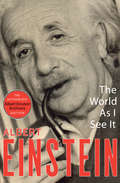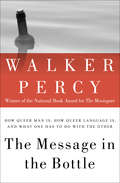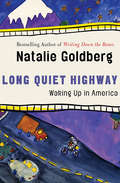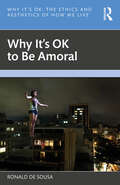- Table View
- List View
Invitation to Sociology: A Humanistic Perspective
by Peter L. BergerThe most popularly read, adapted, anthologized, and incorporated primer on sociology ever written for modern readers Acclaimed scholar and sociologist Peter L. Berger lays the groundwork for a clear understanding of sociology in his straightforward introduction to the field, much loved by students, professors, and general readers. Berger aligns sociology in the humanist tradition—revealing its relationship to the humanities and philosophy—and establishes its importance in thinking critically about the modern world. Throughout, Berger presents the contributions of some of the most important sociologists of the time, including Max Weber, Émile Durkheim, Vilfredo Pareto, and Thorstein Veblen.
Essays in Humanism
by Albert EinsteinThe great thinker reflects on such topics as nuclear weapons, world poverty, and international affairs in this Wall Street Journal bestseller. Nuclear proliferation, Zionism, and the global economy are just a few of the insightful and surprisingly prescient topics scientist Albert Einstein discusses in this volume of collected essays from between 1931 and 1950. Written with a clear voice and a thoughtful perspective on the effects of science, economics, and politics in daily life, Einstein&’s essays provide an intriguing view inside the mind of a genius addressing the philosophical challenges presented during the turbulence of the Great Depression, the Second World War, and the dawn of the Cold War.This authorized ebook features rare photos and never-before-seen documents from the Albert Einstein Archives at the Hebrew University of Jerusalem.
The Wisdom of Leonardo da Vinci (Wisdom)
by The Wisdom SeriesAn intriguing look inside the mind of the Renaissance genius Leonardo da Vinci stood on a bridge between medieval thought and the modern mind. In this selection of entries from his dozens of coded notebooks and unpublished manuscripts, his unending curiosity in the universe and deep knowledge come through in his energetic style. The self-educated da Vinci developed a philosophical system that set him apart from his contemporaries and marked him as the oracle of a new age, and his vivid imagination and straightforward writing style capture the reader&’s attention whether he is writing about his scientific analysis, his opinion of necromancy, discoveries in nature, or the nature of man. Accompanied by a thorough introduction, The Wisdom of Leonardo da Vinci unveils the man&’s deepest thoughts and musings and proves why he remains an intriguing and enduring figure.
The Wisdom of Thoreau (Wisdom)
by The Wisdom SeriesA collection of wise words on solitude, simplicity, nature, and life at Walden from the leader of the transcendentalist movement. In excerpts collected here from his most important works, Henry David Thoreau documents his experiences in nature and the wisdom he finds in his explorations of sound, reading, solitude, and other aspects of leading a simple life at Walden. A fearless individualist, Thoreau explored not only poetic naturalism but also a number of ideas that were groundbreaking for his day, including civil disobedience and environmentalism. This introduction to one of America&’s great thinkers shows that as an essayist and poet-philosopher Thoreau remains a relevant voice in the never-ending quest of man to understand his place in the natural terrain.
The Wisdom of George Santayana (Wisdom)
by The Wisdom SeriesA survey of the influential—and prolific—modern philosopher In dozens of books, magazine articles, and essays, George Santayana infused his philosophy with exquisite language, wit, and subtle humor, prompting one authority to state that he &“writes philosophy more beautifully than any other thinker since Plato.&” The Wisdom of George Santayana makes accessible both his ideas and his oft-quoted aphorisms on a variety of subjects including naturalism, creative imagination, and spirituality without dogma. Organized by books and essays, and highlighting key words and themes, this compilation is an excellent introduction to the man and his work.
A Third Treasury of Kahlil Gibran
by Kahlil GibranA revelatory collection of essays and poems by a master of Eastern philosophyIn these writings, Gibran offers verses and lyric prose that possess all the grandeur of rich music. Here are the great truths and heartening joys drawn from the tears and sufferings of man. Each work sparkles with simile and symbolism, from &“Seven Reprimands,&”containing wise rules to live by, to &“The Sayings of the Brook,&”about the secrets to beauty, wealth, and virtue. These are profound exaltations of a great soul, and a trove of wisdom as relevant today as when it was first written.
Human Emergence and Our Place in the Natural World
by David SprintzenThis book challenges the prevailing, though often unacknowledged, view among most practicing scientists and philosophers that human free will is incompatible with the natural causality that is the basic presupposition of modern science. That position is essentially based on the reductionist view of modern physics that all complex phenomena are thought to be ultimately causally explainable solely as a function of the action of their elemental constituents. The book argues that this mainstream opinion is the appropriate logical result of an inadequate conception of the way nature works. To show this the book first details the fundamental philosophical incoherence in the prevailing scientific world view. It then justifies the critique by outlining and re-describing some key findings of modern science, and presents three related alternative aspects by which we can understand the occurrence of natural emergence. In so doing it is suggested that emergence is a pervasive phenomenon in the natural world, and that human free will is an entirely understandable development of these natural processes, when properly understood, in which humanity is appropriately seen as a natural emergent within the evolutionary processes operating in accord with natural selection. Human Emergence and Our Place in the Natural World is essential reading for all philosophers of metaphysics and of science.
Die Kunst engagierter Gelassenheit: Leidenschaftlich wirken, ohne auszubrennen
by Lukas NiederbergerWie können wir uns mit Leidenschaft für Menschen einsetzen und mit Herzblut für Projekte und Themen brennen, ohne unsere Leichtigkeit und Heiterkeit zu verlieren und auszubrennen? Wie können wir konstruktiv mit Druck und Stress, Misserfolg und Widerständen umgehen, ohne uns lähmen zu lassen? In vier Etappen werden Wege zur engagierten Gelassenheit aufgezeigt. Zunächst erfolgt die Anamnese: Wo und wann ist unsere Seele unruhig und ungelassen? In einem zweiten Schritt werden die tieferen Gründe fürs Ungelassensein gesucht. Warum drehen wir im Hamsterrad? Und weshalb ärgern, fürchten oder sorgen wir uns? Von den Ursachen führen verschiedene Wege zur Gelassenheit: vom konstruktiven Umgang mit unvermeidlichen Situationen bis zum bewussten Trauern und Streiten. Der vierte Teil thematisiert den Königsweg der Seelenruhe: die engagierte Gelassenheit. Sie entsteht überall da, wo wir uns gleichzeitig voll einlassen und die innere Freiheit bewahren. Das Geleitwort verfasste Frau Prof. Dr. Julia Reif, Professorin für Wirtschafts- und Organisationspsychologie an der Fakultät für Betriebswirtschaft an der Universität der Bundeswehr München. Sie hebt darin den transdisziplinären Ansatz sowie die gelungene Verbindung von Theorie und Praxis hervor.
Letters to Solovine, 1906–1955: 1906–1955 (Paperback Ser.)
by Albert EinsteinA provocative collection of letters to his longtime friend and translator that spans Einstein&’s career and reveals the inner thoughts and daily life of a transformative geniusFrom their early days as tutor and scholar discussing philosophy over Spartan dinners to their work together to publish Einstein&’s books in Europe, in Maurice Solovine, Albert Einstein found both an engaged mind and a loyal friend. While Einstein frequently shared his observations on science, politics, philosophy, and religion in his correspondence with Solovine, he was just as likely to express his feelings about everyday life—his health and the effects of aging and his experiences in the various places where he settled and visited in his long career. The letters are both funny and frank, and taken together, reflect the changes—large and small—that took place over a half century and in the remarkable life of the world&’s foremost scientist. Published in English alongside the German text and accompanied by facsimile copies of the original letters, the collected Letters to Solovine offers scholar and interested reader alike unprecedented access to the personal life of Albert Einstein. This authorized ebook features a new introduction by Neil Berger, PhD, and an illustrated biography of Albert Einstein, which includes rare photos and never-before-seen documents from the Albert Einstein Archives at the Hebrew University of Jerusalem.
Signposts in a Strange Land: Essays
by Walker PercyWritings on the South, Catholicism, and more from the National Book Award winner: &“His nonfiction is always entertaining and enlightening&” (Library Journal). Published just after Walker Percy&’s death, Signposts in a Strange Land takes readers through the philosophical, religious, and literary ideas of one of the South&’s most profound and unique thinkers. Each essay is laced with wit and insight into the human condition. From race relations and the mysteries of existence, to Catholicism and the joys of drinking bourbon, this collection offers a window into the underpinnings of Percy&’s celebrated novels and brings to light the stirring thoughts and voice of a giant of twentieth century literature.
The Wisdom of Buddha: The Wisdom Of The Torah, The Wisdom Of The Talmud, The Wisdom Of The Koran, The Wisdom Of Muhammad, And The Wisdom Of Buddha (Wisdom)
by The Wisdom SeriesDiscover the origins of Buddhism and its tenets from the seminal texts Drawn from the sacred books of Buddhism, this collection reveals the insights and beliefs at the heart of the world&’s fourth-largest religion. Siddhartha Guatama, a sixth-century Hindu warrior prince, renounced the world in his search for the meaning of life and became the Buddha, or &“Enlightened One,&” while meditating at Bodh Gaya. From that moment forward the Buddha sought to share his own enlightenment with all of mankind. Through the Four Noble Truths and the Noble Eightfold Path, the Buddha taught followers to let go of desire and worldly attachments in order to alleviate suffering while embracing practices of meditation, mindfulness, and right conduct. Covering the birth and death of the Buddha, as well as the major tenets of Buddhism, including karma and the middle doctrine, The Wisdom of Buddha offers a profound view of the Buddhist religion and its founder.
The Wisdom of the Koran: The Wisdom Of The Torah, The Wisdom Of The Talmud, The Wisdom Of The Koran, The Wisdom Of Muhammad, And The Wisdom Of Buddha (Wisdom)
by The Wisdom SeriesDiscover the beliefs and lessons of Islam&’s sacred textThe Koran, the sacred text at the heart of the second-largest religion in the world, is regarded by Muslims as the exact word of God as revealed to the prophet Muhammad. Representing the ultimate authority on almost every issue related to Muslim life, the Koran&’s lessons and parables offer the faithful moral and spiritual guidance. In The Wisdom of the Koran, readers will discover a selection of key chapters such as &“The Night Journey&” and &“The Cave,&” footnotes to convey context and meaning, as well as several stories from Judeo-Christian history. This invaluable anthology is an excellent step toward greater understanding of one of the finest pieces of Arabic prose and the Muslim faith.
The Wisdom of Bertrand Russell (Wisdom)
by The Wisdom SeriesAn A-to-Z compendium of Russell&’s writingOne of the great minds of the twentieth century, Bertrand Russell explored philosophy, mathematics, and a variety of other intellectual, political, historical, and social issues in his lifetime. In this indispensable and easily accessible guide, drawn from his books and essays, readers will find Russell&’s fundamental principles, from objectivity to ontological arguments to logical certainty, in his own words. Russell also explored topics such as war, evil, and the purpose and goal of human existence. Russell&’s intellect transcends time and remains a relevant source of inspiration and thought today.
The Wisdom of Karl Marx (Wisdom)
by The Wisdom SeriesAn A-to-Z reference of the great social reformer&’s own words Among modern philosophers, few have had a greater impact on history than Karl Marx. Now this easy-to-use introduction to the nineteenth-century theorist breaks down his work into definitions of his terms and concepts, including Bourgeois State, Classless Society, and Freedom of the Press. Accompanied by an insightful introductory essay that puts the included excerpts from his works in context, The Wisdom of Marx is essential reading for an understanding of the man whose work incited far-reaching social and economic change.
The Wisdom of the Kabbalah (Wisdom)
by The Wisdom SeriesExplore the third of the great literatures in Judaism While many readers may have heard of Kabbalah in recent years, how many understand the origins and unique perspective of this collection of Jewish mystical beliefs? Handed down in the oral tradition for thousands of years and transcribed in fourteenth-century Spain, the Kabbalah is the classical expression of Jewish mysticism. This collection draws from the main work of Kabbalah—Sepher ha-Zohar, or The Book of Splendor—and offers insight into the great body of Hebrew literature that sprang up and grew parallel to the traditional writings of rabbinical literature. Written in the dialectic style as a commentary to the Torah, the Kabbalah examines man&’s mystical union with God in thoughts of wisdom and deeds of kindness through a symbol-laden examination of the God before creation. A mix of ethics and mysticism, Kabbalah&’s wisdom is frequently imparted through gematria, or a symbolic language based in numbers that correspond with the letters of the Hebrew alphabet. This ebook features a new introduction, image gallery, and index of the Hebrew alphabet.
Autumn Leaves
by André GideThis collection of reflective essays forms a &“spiritual autobiography&” of André Gide, a key figure of French letters André Gide, a literary and intellectual giant of twentieth-century France, mines his memories and personal observations in this collection of essays. Gide&’s reflections and commentary masterfully showcase his delicate writing style and evocative sensibility, yielding new insights on writers such as Goethe and contemporaries Joseph Conrad, Nicolas Poussin, Arthur Rimbaud, and Paul-Marie Verlaine. Through it all, Gide skillfully investigates humanity&’s contradictory nature and struggles to resolve the moral, political, and religious conflicts inherent in daily life. This ebook features a new introduction by Jeanine Parisier Plottel, selected quotes, and an image gallery.
The Wisdom of Oscar Wilde (Wisdom)
by the Wisdom ofA comprehensive selection of his quips, aphorisms, and witOne of the most well known personalities of his day, Oscar Wilde charmed and beguiled readers and audiences with his eloquent and biting observations, his smart quips, and the witticisms peppering his own speech and the speech of his characters. The Wisdom of Oscar Wilde collects both his best-loved quotes and longer excerpts, revealing a man wise to human nature and his times, and never shy with his searing comments on men, women, art, behavior, children, politics, youth, and a range of other topics. Drawing from his plays, articles, reviews, speeches, letters, and other works, this definitive volume is an entertaining immersion into the world of this charming genius.
Essays in Aesthetics (Essay Index Reprint Ser.)
by Jean-Paul SartreRenowned French philosopher Jean-Paul Sartre references artists such as Tintoretto, Calder, Lapoujade, Titian, Raphael, and Michaelangelo in discussing how great art of the past relates to the challenges of his eraEssays in Aesthetics is a provocative collection that considers the nature of art and its meaning. Sartre considers the artist&’s &“function,&” and the relation of art and the artist to the human condition. Sartre integrates his deep concern for the sensibilities of the artist with a fascinating analysis of the techniques of the artist as creator. The result is a vibrant manifesto of existentialist aesthetics. By looking at existentialism through the lens of great art, Essays in Aesthetics is just as valuable a read to the artist as it is to the philosopher.
The Social Construction of Reality: A Treatise in the Sociology of Knowledge
by Peter L. Berger Thomas LuckmannA watershed event in the field of sociology, this text introduced &“a major breakthrough in the sociology of knowledge and sociological theory generally&” (George Simpson, American Sociological Review). In this seminal book, Peter L. Berger and Thomas Luckmann examine how knowledge forms and how it is preserved and altered within a society. Unlike earlier theorists and philosophers, Berger and Luckmann go beyond intellectual history and focus on commonsense, everyday knowledge—the proverbs, morals, values, and beliefs shared among ordinary people. When first published in 1966, this systematic, theoretical treatise introduced the term social construction,effectively creating a new thought and transforming Western philosophy.
Spirits Rebellious: Large Print
by Kahlil GibranA clarion call for freedom from one of the twentieth century&’s most important philosophers and writers, Kahlil Gibran A book so powerful it was burned in the marketplace of Beirut at the time of its publication, Kahlil Gibran&’s Spirits Rebellious is a clarion call for freedom in his homeland of Lebanon—for individuals and society. Gibran&’s bitter denunciation of religious and political injustice flows through his lyric pen in three parables, that of &“Madame Rose Hanie,&” &“The Cry of the Graves,&” and &“Kahlil the Heretic.&” His vision of liberty is no less powerful today.
The Wisdom of Sartre (Wisdom)
by The Wisdom SeriesAn invaluable introduction to the leading French intellectual of the twentieth century The Wisdom of Sartre offers key excerpts from the eloquent French writer, playwright, and philosopher&’s masterpiece, Being and Nothingness. From this collection, readers will discover the strongest themes in his early philosophical work: an ontological account of what it means to be human, and the role of perception, knowledge, and consciousness in the practical demands of life. Sartre&’s view that man&’s freedom is a unique source of both misery and pleasure and that the question of which will prevail depends on man&’s awareness and commitment to his freedom is both thought provoking and timely.
The World As I See It (Deluxe Hardbound Edition Ser.)
by Albert EinsteinOne of the world&’s greatest minds addresses religion and science, war and peace, and the treatment of minorities in this authorized collection. In the aftermath of the First World War, Albert Einstein writes about his hopes for the League of Nations, his feelings as a German citizen about the growing anti-Semitism and nationalism of his country, and his myriad opinions about the current affairs of his day. In addition to these political perspectives, The World As I See It reveals the idealistic, spiritual, and witty side of this great intellectual as he approaches topics including &“Good and Evil,&” &“Religion and Science,&” &“Active Pacifism,&” &“Christianity and Judaism,&” and &“Minorities.&” Including letters, speeches, articles, and essays written before 1935, this collection offers a complete portrait of Einstein as a humanitarian and as a human being trying to make sense of the changing world around him. This authorized ebook features a new introduction by Neil Berger, PhD, and an illustrated biography of Albert Einstein, which includes rare photos and never-before-seen documents from the Albert Einstein Archives at the Hebrew University of Jerusalem.
The Message in the Bottle: How Queer Man Is, How Queer Language Is, and What One Has to Do with the Other
by Walker PercyFrom the National Book Award–winning author of The Moviegoer: &“These essays . . . have a way of quickening the spirit and cleansing the sight&” (The New Republic). Before winning the National Book Award for fiction in 1962, Walker Percy was an established scholar of science, philosophy, and language. Presented here are his strongest essays in those subjects, offering what he called a &“theory of man for a new age.&” Ambitious yet readable, The Message in the Bottle encapsulates the philosophical foundations of his groundbreaking novels, perfect for Percy fans and new readers alike. From discussions on the dislocation of man in the twentieth century to theories on why humans talk while other animals do not, thisis an enlightening collection from one of the South&’s most celebrated writers.
Long Quiet Highway: Waking Up in America
by Natalie GoldbergThe author of Writing Down the Bones shares her story of self-discovery through Zen Buddhism, in &“beautiful and simple prose&” (Library Journal). In this autobiographical work, Natalie Goldberg takes us on a journey from her suburban childhood to her maturation as a writer. From the high-school classroom where she first listened to the rain, to her fifteen years as a student of Zen Buddhism, Natalie Goldberg&’s path is by turns illuminating, disciplined, heartbreaking, hilarious, and healing. Along the way she reflects on her life and work in prose that is both elegant and precise, reminding the reader of what it means to be fully alive. This ebook features an illustrated biography of Natalie Goldberg, including rare photos and never-before-seen documents from the author&’s personal collection.
Why It's OK to Be Amoral (Why It's OK)
by Ronald de SousaWhy It’s OK to Be Amoral argues that self-righteous moralism has replaced religion as a source of embattled and gratuitous certainties. High-minded moral convictions invoke the authority of sacred moral truths, but there are no such truths. In reality, moral passions are rooted in atavistic emotional dispositions and arbitrary social conventions.While public and private discourse is saturated with guilt, shame and righteous indignation, professional philosophers, under cover of clever argumentation, promote the utopian idea that all practical questions have uniquely right answers—providing that you adopt the right moral principles. But their justifications for those principles appeal to contested ‘foundations’, among which no rational adjudication is possible. Moreover, because there are two discrepant ways of understanding motivation, our access to agents’ true reasons is never sufficiently reliable to warrant moral praise or blame. Finally, every agent has a wide diversity of reasons for action, yet moralists claim that some reasons trump all others, because they are ‘moral’ reasons. Since these too must be grounded in facts, that amounts to double counting some reasons.Having exposed these aspects of the institution of morality, this book suggests that if we cannot abstain altogether from moralising, we can at least try to use it against itself.Key Features Describes and criticises seven approaches to the question, Why should I do or not do X? Develops an original objection to the idea of identifying a domain of moral reasons: namely, that it amounts to the unwarranted double counting of a subset of our reasons. Describes two ways of thinking about reasons and choices, and explains how the discrepancy between them makes it impossible to assess an agent’s motivation reliably enough to warrant moral praise or blame. Outlines the subtle changes in attitude involved in espousing amoralism, without giving up on rational choices and honest political commitments.
